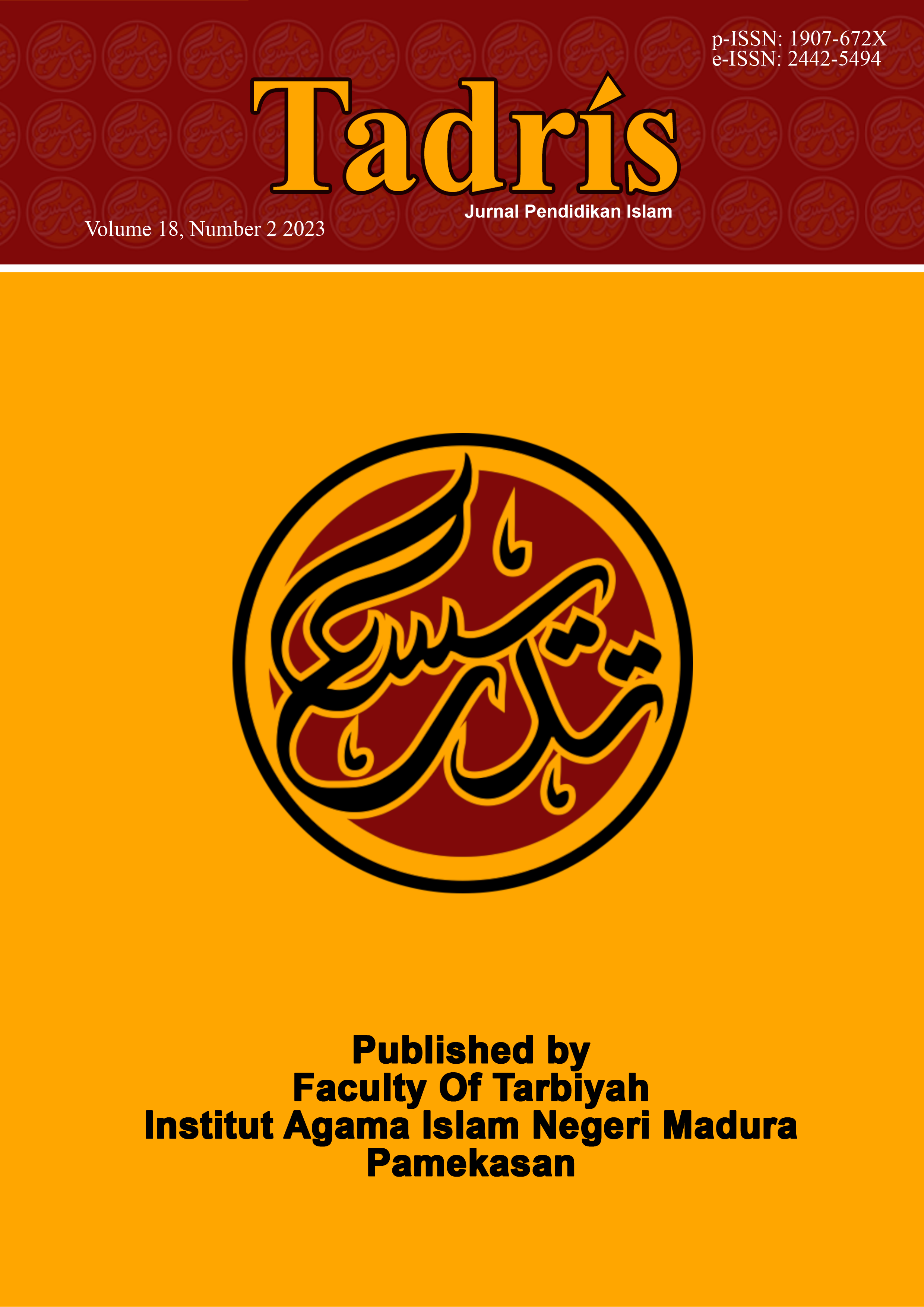Strategic Management in Islamic Full Day School Institutional Development in the Era of Artificial Intelligence
 Abstract views: 340
,
Abstract views: 340
,
 PDF downloads: 181
PDF downloads: 181
Abstract
Strategic management in the development of Islamic full day school institutions has main components, namely the first organizational environment analysis functions as an early detection and prediction of threats and opportunities, the second analysis of the organizational profile functions as a detection of organizational weaknesses and strengths, the third organizational strategy functions as the achievement of organizational goals.(Nazaruddin 2020). This study uses a qualitative research method with a case study approach. The results of the study show that in strategic management in the development of Islamic full day school institutions in the era of artificial intelligence, there are three things that must be considered, first, strategic management, this process requires a SWOT analysis, carried out thoroughly on the internal and external environment of the school, identifying strengths , weaknesses, opportunities, and threats to future education related to the use of technology. This analysis will facilitate the preparation of the vision and mission as well as targets and programs. Next Second. Institutional Development Strategy, requires a Strategic Plan (RENSTRA), which is a document that contains long-term and short-term goals for future education in the use of Artificial Intelligence (AI) technology. The plan includes specific steps to be taken to integrate future education into the day-to-day activities of the school. And it is necessary to pay attention to the strengthening of fundamentals, strengthening existence and building partnerships and communities. The three Quality Assurance Systems are carried out in a consistent and consistent manner in institutional development, so that the institution is automatically a quality institution. In accordance with the provisions of the ministry of education and culture, the quality assurance system is organized by internal institutions or known as the Internal Quality Assurance System (SPMI) and which is held by the Government as the main person in charge of the education quality system or the External Quality Assurance System (SPME).
Downloads
References
Alawiyah, Faridah, ‘Standar Nasional Pendidikan Dasar Dan Menengah’, Aspirasi, 8.1 (2017), 81–92
Arwani, Ragil, ‘Formulasi Strategi Pengembangan Kelembagaan Pendidikan Tinggi Berbasis Pesantren’, 1 (2022), 20–36
Fahmi, Agus, ‘Polarisasi Manajemen Strategik Pendidikan Dalam Implementasi Full Day School’, Jurnal Visionary : Penelitian Dan Pengembangan Dibidang Administrasi Pendidikan, 4.1 (2019) <https://doi.org/10.33394/vis.v4i1.1973>
Haryana, Enjang, ‘Implementasi Manajemen Stratejik Kepala Sekolah Dalam Meningkatkan Mutu Sekolah’, Indonesian Journal of Education Management & Administration Review (IJEMAR), 2.1 (2018), 223–30
Hermansyah, ‘Manajemen Lembaga Pendidikan Sekolah Berbasis Digitalisasi Di Era Covid 19’, Fitrah, 12.1 (2021), 28–46
Islamic, Jurnal, and Education Manajemen, ‘Manajemen Strategi Kepala Madrasah Dalam Peningkatan Mutu Lembaga Pendidikan’, 4.1 (2019), 39–54 <https://doi.org/10.15575/isema.v3i2.5268>
Istikomah, dkk, Sistem Penjaminan Mutu, 2016
Khatami, M, and Z Arifin, ‘Manajemen Strategik Pada Lembaga Pendidikan Islam’, Proceedings of International Conference on Islamic Studies “Islam & Sustainable Development”, 2021, 218–25 <https://jurnal.ar-raniry.ac.id/index.php/icis/article/view/12670%0Ahttps://jurnal.ar-raniry.ac.id/index.php/icis/article/viewFile/12670/6603>
KHOTIJAH, S, ‘Manajemen Full Day School (Studi Kasus Sd Nasima Dan Mi Al-Khoiriyyah 1 Kota Semarang)’, Eprints.Walisongo.Ac.Id, 2019 <http://eprints.walisongo.ac.id/12150/1/TESIS_1703038004_SITI_KHOTIJAH.pdf>
Lia, Santika, ‘MANAJEMEN STRATEGIK PENGEMBANGAN MUTU SEKOLAH BERBASIS BOARDING SCHOOL DAN FULL DAY SCHOOL’, הארץ, 8.5.2017, 2022, 2003–5 <https://www.who.int/news-room/fact-sheets/detail/autism-spectrum-disorders>
LPPM UM Jember, ‘Rencana Induk Pengembangan Penelitian’, 2015, 2021–35
Nazarudin, Manajemen Startegik, NoerFikri Offset, 2020
Ouyang, Fan, and Pengcheng Jiao, ‘Artificial Intelligence in Education: The Three Paradigms’, Computers and Education: Artificial Intelligence, 2.April (2021) <https://doi.org/10.1016/j.caeai.2021.100020>
Pratiwi, Sri Nurabdiah, ‘Manajemen Strategi Sumber Daya Manusia Pendidikan Di Era 4.0’, EduTech: Jurnal Ilmu Pendidikan Dan Ilmu Sosial, 6.1 (2020), 109–14 <https://doi.org/10.30596/edutech.v6i1.4403>
Putra, Alan Alfiansyah, Karo Karo, Khairul Usman, Liliana Puspa Sari, Ratna Dewi, Benny Aprial Simangunsong, and others, ‘Jurnal Ilmiah STOK Bina Guna Medan HASIL PEMBENTUKAN KARAKTER SISWA PADA SEKOLAH FULL DAY SCHOOL RESULT OF THE FORMATION OF STUDENT CHARACTERS IN FULL DAY SCHOOL’, Jurnal Ilmiah STOK Bina Guna Medan, 2.1 (2020), 43–50
Sugiyono, ‘Penerbit Pustaka Ramadhan, Bandung’, Analisis Data Kualitatif, 2016, 180 <https://core.ac.uk/download/pdf/228075212.pdf>
Tarbiyah, Fakultas, ‘Manajemen Pengelolaan Islamic Full Day School Di SDIT AS SALAM Kota Jayapura’, 1 (2013), 421–36
Yayasan Lembaga Pendidikan Islam Al Hikmah, Al Hikmah Mendidik Untuk Negeri (Surabaya: Yayasan Lembaga Pendidikan Islam Al Hikmah, 2019)
Copyright (c) 2023 TADRIS: Jurnal Pendidikan Islam

This work is licensed under a Creative Commons Attribution-NonCommercial 4.0 International License.
The journal operates an Open Access policy under a Creative Commons Non-Commercial 4.0 International license. Authors who publish with this journal agree to the following terms:
- Authors retain copyright and grant the journal right of first publication with the work simultaneously licensed under a
 Commons Attribution-NonCommercial 4.0 International License
Commons Attribution-NonCommercial 4.0 International Licensethat allows others to share — copy and redistribute the material in any medium or format, and adapt — remix, transform, and build upon the material.
- Authors are able to enter into separate, additional contractual arrangements for the non-exclusive distribution of the journal's published version of the work (e.g., post it to an institutional repository or publish it in a book), with an acknowledgement of its initial publication in this journal.
- Authors are permitted and encouraged to post their work online (e.g., in institutional repositories or on their website) prior to and during the submission process, as it can lead to productive exchanges, as well as earlier and greater citation of published work (see The Effect of Open Access).














